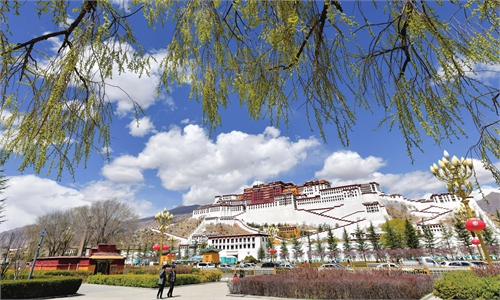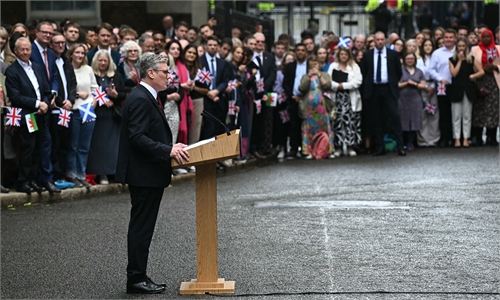
Illustration: Xia Qing/GT
Britain's top diplomat was not going to be able to reset his country's relations with China in a single, brief visit this past weekend, but, as the saying goes, a journey of a thousand miles begins with a single step. Foreign Secretary David Lammy seemed prepared to make that first move during his trip to Beijing. Only time will tell whether this tentative first step leads both countries to a welcome destination.
Lammy and his government stressed that Britain's critical attitudes toward China over policy issues like Russia and human rights have not changed. What appears to be different is the tone of engagement. While former prime minister Rishi Sunak had characterized China as an "epoch-defining" security challenge and the UK's "greatest state-based threat" economically, the new Labour government seems eager for positive interaction. Readouts after Lammy's meetings with Chinese officials conspicuously repeated the word "pragmatic."
During Lammy's trip, nobody expected London and Beijing to see eye-to-eye on every issue. In the past, Lammy had been frank in his criticisms of China, and he was never going to change his opinions just to ensure his trip run smoothly. But, he has also demonstrated pragmatism.
Ahead of Lammy's visit, there was somewhat an encouraging recognition of China's sensitivities regarding the key subject of the Taiwan question. His office in London had called for a journey to the UK by former Taiwan regional leader Tsai Ing-wen to be postponed. This small gesture made his job easier. Furthermore, this is a welcome acknowledgement of Beijing's position that the Taiwan question is a sensitive internal matter. It is also encouraging that Britain has decided against joining its EU and American allies in imposing tariffs on Chinese electric vehicles, which serves the interests of both China and Britain.
The UK's standpoint echoes former prime minister David Cameron's realistic approach which balanced differences with areas of agreement. This changed since 2020 when then prime minister Boris Johnson caved to pressure from the US and reversed decisions allowing the involvement of Huawei in the rollout of the UK's 5G network. Pretty soon, allegations of spying, human rights abuses and cyberhacking were routinely aimed at China. Successive prime ministers engaged in ill-informed, clumsy anti-China rhetoric.
Britain's new Labour government seems to recognize that it's time for a course correction. In a political pamphlet Lammy wrote for the self-styled socialist organization the Fabian Society in March last year, he observed, "We no longer live in a unipolar world defined by the UK's most important bilateral ally the United States. Instead, the world has become multipolar." In the document he was critical of China's policies, but he also talked of prioritizing diplomacy in Britain's engagement with the world.
He also said, "Our strategy will be based on 'three Cs': compete, challenge and, where we can, cooperate…we also recognize it is important that the UK engages with China where it is in our interests to do so - whether on climate change, trade or global health." Now the Labour administration has commissioned a government-wide audit of the UK-China relationship.
Last week, Britain's Secretary of State for Business and Trade Jonathan Reynolds said the UK "needs more engagement with China." Rachel Reeves, the UK's new Chancellor of the Exchequer, is reportedly eyeing a trip to China early next year. China is one of the UK's largest trading partners, so it is hard to see how it can afford not to engage. The new UK government has spoken repeatedly about growth being the answer to Britain's current economic problems. This cannot be achieved without deeper engagement with China. If a diplomatic and political rapprochement leads to enhanced trade with China, it would be a welcome development for both countries.
During his meeting with Lammy, Chinese Foreign Minister Wang Yi, also a member of the Political Bureau of the Communist Party of China Central Committee, said, "China-Britain relations ... now stand at a new starting point." After some years of unpredictability, it's time for stability. The word "pragmatic" does not sound as glamorous as "golden," but perhaps it is more realistic.
The author is a journalist and lecturer in Britain. opinion@globaltimes.com.cn



